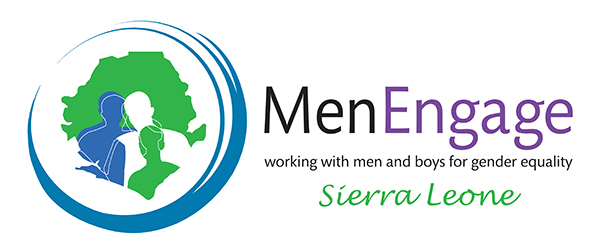
In addressing the issues surrounding sexual and gender-based violence (SGBV) and sexual and reproductive health rights (SRHR) across the world, there has been little focus on the important roles men and boys play in ending this century’s old menace. Research and other programmes that involve men and boys tend to be largely focused on men and boys as perpetrators of violence and abusers of women and girls in societies, recognising them for the damages they cause through harmful behaviours and a lack of engagement in trying to attain gender equality. Few have focused on the positive roles that some men and boys play with families and societies and few have sought to enhance these positive roles that some men play.
Furthermore, few studies have examined, for example, fatherhood experiences in post-conflict settings, such as Sierra Leone, where many men and boys face significant mental and social problems as a result of war and other post-conflict stressors, though this is not any justification for SGBV. This gap in knowledge and approach to ending SGBV is problematic because it impedes development of effective and culturally relevant interventions that may promote family well-being and social cohesions at societal level.
This is the void that MenEngage Sierra Leone network seeks to fill. The network, which is made up of women-led, human rights advocacy, gender equality, women’s empowerment, youth-led and media organisations, amongst others, has had the opportunity to learn and share among its network members and beyond the various expertise necessary for working with policy-makers, duty-bearers, security sectors, service providers, religious leaders, local community command structures and educational institutions to name but a few, in relaying the messages of the need to engage men and boys in transformative masculinities.
Through this multi-lateral and multi-sectoral approach, we have been able to widely disseminate a policy report on Engaging Men in HIV and GBV Prevention, SRHR Promotion and Parenting and to engage diverse stake-holders on these issues. Amongst some of the findings, the analysis found that Sierra Leone’s National Strategic Plan for HIV & AIDS 2011-2015 did not incorporate a sufficient focus on gender issues or on the need to engage with men and boys for an impactful response to HIV and AIDS.
This has also helped us participate in and contribute to processes that led to the passing into law of three gender-related Bills in 2007. The Domestic Violence Act criminalises all forms of violence in domestic settings, the Registration of Customary Marriages and Divorce Act require all marriages before, during and after the passing of the law to be officially registered and grants partners the right to divorce, and the Devolution of Estates Act permits family members, including the wife, wives or husband to inherit the property of the deceased partner.
The passing of these laws has been a landmark victory for women in Sierra Leone who have experienced injustices because of inadequacies for redress in the legal system.
Furthermore, we have also been part of the enactment of the 2007 Child Rights Act, which seeks to protect children against all forms of abuse as well as the 2012 Sexual Offences Act, which forbids all sexual acts that occur without consent.
The Sexual Offences Act increases the minimum jail sentence for sexual violations from two years to between 5-15 years. It defines consent as an agreement by choice with the person having both the freedom and the capacity to make that choice. Persons under the age of 18 years are not capable of giving consent under the Act. Marriage can also not be used as a defence against violations of the Act, effectively prohibiting forced sex in marital relationships. The Act protects children, especially girls, from being abused by teachers, as well as traditional and religious leaders, among others.
MenEngage Sierra Leone network members attended almost all meetings and debates and we added our voices to civil society and human rights forums that helped facilitate these processes. Additionally, network members have, in today’s world of ever-increasing conflicts, come to understand and have also taught communities, how war and conflict situations shape young men’s masculinities and attitudes towards women, girls and all humanity; and how these need to be challenged to prevent sexual and reproductive health rights abuses.
Through workshops, semi structured interviews, radio talk shows, town hall meetings, trainings, seminars and symposiums we have worked to sensitise and help communities understand what it means to be a man in the context of debilitating poverty and personal and public health crises such as HIV & AIDS, and STIs, especially in a post-conflict and Ebola-ravaged society such as Sierra Leone. Moreover, the few years’ work of engaging men and boys has deepened our understanding of SGBV and SRHR issues and informed insights about inter-generational issues, including culture and traditions that militate against women and girls.
However, our work doesn’t go without challenges – notably, inadequate funding support to continue the work, and few study opportunities for network members to attend international trainings to advance their work on masculinities, fatherhood, SRHR, SGBV, women’s health and empowerment.
It is our belief that with increased support we can do better and amazing work.